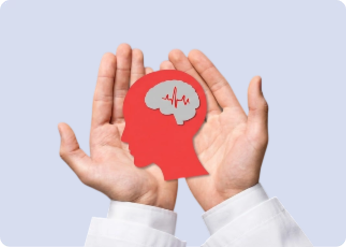Области применения препарата Мексидол®:
назначения при заболеваниях
Применение препарата Мексидол® эффективно в терапии острых и хронических цереброваскулярных заболеваний, вызванных ишемией и гипоксией различного генеза. На сегодняшний день препарат является одним из основных средств базовой нейропротекторной терапии головного мозга благодаря мультимодальному механизму действия, который обеспечивает широкий спектр фармакологических эффектов. Мексидол® с успехом применяется в различных областях медицины: неврологии, терапии, офтальмологии, кардиологии, нейропедиатрии, психиатрии и наркологии.

Острые нарушения мозгового кровообращения

Инсульт – острое нарушение мозгового кровообращения, вызывающее поражение и гибель нервных клеток. Инсульт характеризуется внезапным (в течение нескольких минут, часов) появлением очаговой и/или общемозговой неврологической симптоматики, которая сохраняется более 24 часов или приводит к смерти больного в более короткий промежуток времени вследствие цереброваскулярной патологии. Применение препарата Мексидол® в острейшем периоде ишемического инсульта на догоспитальном этапе с последующим проведением тромболитической терапии положительно влияет на снижение неврологического дефицита независимо от тяжести заболевания. Мексидол® подтвердил свою эффективность и безопасность в многочисленных исследованиях. Исследование ЭПИКА доказало уменьшение выраженности неврологического дефицита и улучшение качества жизни пациентов при применении препарата Мексидол® в комплексной терапии ишемического инсульта в остром и раннем восстановительном периодах.
Хроническая
ишемия мозга

Хроническая ишемия головного мозга – медленно прогрессирующее структурно-функциональное изменение головного мозга. Такое изменение возникает вследствие диффузного и/или мелкоочагового повреждения мозговой ткани в условиях длительно существующей недостаточности церебрального кровоснабжения. Важным компонентом лечения хронической ишемии головного мозга является назначение препаратов, обладающих мультимодальным действием с антиоксидантной, антигипоксантной и нейропротекторной активностью.
Ярким представителем мультимодальных нейропротекторов является Мексидол® (оригинальный этилметилгидроксипиридина сукцинат). Препарат показал высокую степень эффективности и безопасности в международном многоцентровом рандомизированном двойном слепом плацебо-контролируемом исследовании терапии пациентов с хронической ишемией мозга (исследование МЕМО).
Когнитивные нарушения
на фоне артериальной гипертензии

Когнитивные расстройства представляют собой различные по степени тяжести нарушения высших психических функций. К таким функциям относятся: память, внимание, гнозис, праксис, речь, социальный интеллект и управляющие функции. В результате патологических процессов в тканях головного мозга происходят нарушения влияющие на эти функции. Зачастую церебральные симптомы служат причиной обращения пациентов ко врачу и начала лечения артериальной гипертензии (АГ). В первую очередь пациенты с АГ предъявляют жалобы на головную боль, головокружение, ухудшение внимания, забывчивость, общую слабость. Это связано с тем, что одним из основных органов-мишеней при АГ является головной мозг. Применение препарата Мексидол® в терапии когнитивных расстройств у пациентов с цереброваскулярными заболеваниями, такими как хроническая ишемия мозга (ХИМ) с сопутствующей артериальной гипертензией и без нее, показало высокую эффективность и безопасность.
Синдром дефицита внимания
и гиперактивности у детей

Синдром дефицита внимания и гиперактивности у детей. Синдром дефицита внимания и гиперактивности* (СДВГ) – расстройство нервной системы, влияющее на поведение, концентрацию внимания и обучение детей. Дети с СДВГ отличаются невнимательностью, высокой отвлекаемостью, избыточной двигательной активностью, импульсивным поведением, проблемами в общении. Лечение СДВГ должно включать в себя комплекс мер, которые учитывают индивидуальные особенности ребенка. Следует принять во внимание ключевую причину заболевания, звенья патогенеза, клинические проявления, наличие коморбидных заболеваний. Мексидол® — современный нейрометаболический препарат, доказавший свою эффективность при лечении СДВГ. Препарат имеет хороший профиль безопасности, что доказано в исследовании МЕГА. В связи с этим применение препарата Мексидол® распространено в педиатрической практике.
Глаукома

Глаукома — это мультифакторное нейродегенеративное заболевание глаз, характеризующееся развитием и прогрессированием глаукомной атрофии зрительного нерва с потерей зрительных функций, независимо от уровня внутриглазного давления (ВГД) [1, 2]. Повышенный уровень внутриглазного давления можно рассматривать как важное, но не единственное патогенетическое звено в развитии глаукомы.
ИНФОРМАЦИЯ ПРЕДНАЗНАЧЕНА ДЛЯ МЕДИЦИНСКИХ И ФАРМАЦЕВТИЧЕСКИХ РАБОТНИКОВ. ДАННАЯ ИНФОРМАЦИЯ НЕ МОЖЕТ СЛУЖИТЬ ЗАМЕНОЙ КОНСУЛЬТАЦИИ ВРАЧА.
Источник фото и изображений shutterstock.com